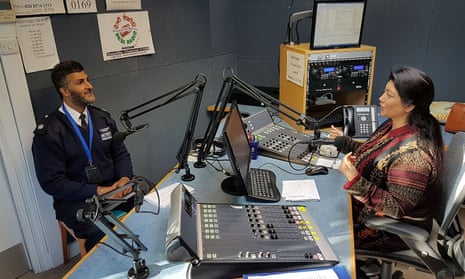In 2010, hundreds of English Defence League protesters marched through Peterborough. There were 11 arrests for public order offences. When they took to the city’s streets again in 2014, community leaders decided to take action to counter extremism, which had been growing in the city for some time. “We set up a radio station to tackle a growing community cohesion problem,” says Amir Suleman, a businessman and volunteer community worker. Salaam Radio started broadcasting in 2016, with a mission to tackle negative stereotypes of Islam and to provide the city with its first Muslim radio station.
In October 2017, the radio station hosted a meeting between the leader of the EDL and the chairman of one of Peterborough’s five mosques, ahead of EDL’s third organised demo in the city. “It was important that we were able to correct them on a lot of inaccuracies,” says Suleman, one Salaam’s seven volunteer directors. “We’re anti-extremism, whether it’s the far right or religious”, says Suleman, one Salaam’s seven volunteer directors. “It’s not easy to do this work, not easy at all. But it’s something we feel very passionate about: it was the reason we went into community media – to use it as a platform to break down barriers between different backgrounds, whether that’s faith, gender or sexuality. Salaam Radio, from the outset, has been a staunch activist for the reporting of hate crimes and incidents.” Presenters and guests are not solely Muslims.
An EDL regional organiser who left the far-right group is now a frequent guest on the station, which has 12,000 regular listeners to its FM broadcasts and reaches more than 30,000 via Facebook, while a local vicar is due to present a six-week series of programmes on community issues.
Salaam is one of 255 community radio stations across the UK, with a total of 3.5 million local listeners and about 20,000 volunteers. A further 54 stations have been granted a licence, but have yet to begin broadcasting.They are non-profit and transmit to a wide range of people, from lonely residents in Aberystwyth, to low-income households in east Leeds and Panjabi speakers in London. Others offer opportunities to underrepresented and hard-to-reach groups, such as Falmouth-based Source FM, which has a number of learning-disabled presenters.
“Many of these stations rely on the hard work and enthusiasm of volunteers, and they often bring tangible benefits, like work experience and training opportunities, to their local areas,” says Neil Stock, Ofcom’s director of broadcast licensing.
But community radio is still stuck in the analogue era. While many stations – including Salaam – broadcast via Facebook, YouTube and their websites, when it comes to radio transmissions, community stations only transmit on FM or AM – and are not available on digital radio. “When you buy a digital radio, you expect to have your station on it,” says Richard Berry, senior lecturer in radio at the University of Sunderland. “At the moment, people have to flit back to FM to get their community radio station.” Having to survive on less than £50,000 a year, moving to digital is beyond the reach of many, due to high transmission costs of existing digital radio licences. But the government wants to change that. Following a successful pilot of more localised digital licences, known as small-scale DAB (SSDAB), the Department for Digital, Culture, Media and Sport (DCMS) last month announced plans to roll out SSDAB across the UK. This would see licences awarded to organisations to run multiple small-scale local digital stations. Yet there are concerns that the new licences, which would cost about £20,000, could be dominated by commercial radio stations with deep pockets unless there are restrictions to prevent this.
If a community station was awarded an SSDAB licence it would host many channels and commercial stations would pay it to rent their own digital channel, while community stations would pay next to nothing. But if commercial operators get the licence, they could charge full rates to community stations, which would put a digital transmission out of their reach.
Lucinda Guy, chair of the Community Media Association, says: “Not-for-profit media is appallingly underfunded”, despite doing “astoundingly important and brave work to heal divided communities, tackle extremism, and boost participants’ mental health. We know that the best foil to divisive rhetoric is to increase the power of moderate voices in those communities to be heard, and yet we see station managers around the country struggling to eat and pay the bills while doing this excellent and essential work to support their communities.” While the government is considering whether the new licences should reserve digital radio capacity for existing and new community stations, the CMA does not feel this goes far enough. Guy adds: “Unless SSDAB is in the ownership and control of communities, which can curate a range of stations that are interesting for local people, we fear that small-scale local radio will deliver profit, not social benefit.”
Ofcom’s Community Radio Fund offers grants to help support the costs of running community radio stations. A DCMS spokesman says: “We recognise these stations provide an important service for local people and want to ensure they can broadcast digitally.”
Back in Peterborough, Suleman is proud of what his radio station has achieved. “Salaam Radio, in less than two years, has become a recognised voice of the community. Without it, there is no central voice of unity, bridge building, or tackling of issues that matter to the community as a whole. Having a neutral platform where the peace and love of real Islam can shine through and benefit all is, in essence, the sole need for such a station. We are serving the community as any community radio station should be.”

Comments (…)
Sign in or create your Guardian account to join the discussion